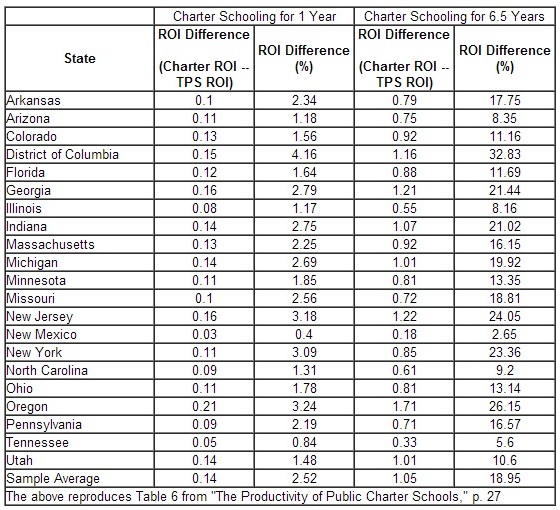Publisher's note: The author of this post is Dr. Terry Stoops, who is the Director of Education Studies at the John Locke Foundation.
Charter schools are worth the investment
Two weeks ago, I discussed a report on educational productivity published by the Center for American Progress, a liberal think tank located in D.C. This week, I'll take a look at a new report on charter school productivity published by researchers at the University of Arkansas's Department of Education Reform.
Educational productivity measures the relative return on investment (ROI) for schools and school districts. In other words, what is the relationship between inputs (money) and outputs (test scores)? After all, comparing state, district, or school expenditures in isolation may be popular, but it is not a terribly illuminating exercise.
While the Center for American Progress report referenced above allowed readers to examine ROI for individual school districts in 50 states and D.C., the University of Arkansas report compared productivity between charter and district school sectors in 28 states (including North Carolina) and D.C. That means that ROI statistics for individual charter schools are not available. If researchers reported that data, we would expect to see large variations in charter school ROI within each state.
Nevertheless, charter school proponents will find that the University of Arkansas report provides very good news. According to a Department of Education Reform summary, the research team concluded that "public charter schools are more cost effectiveness [sic] and deliver a higher ROI both on average and in each of the 28 states included in the study." Specifically, researchers found,
The average cost effectiveness advantage of charters relative to traditional public schools is 17 NAEP points in math and 16 NAEP points in reading, per $1000 of revenue. The average cost ROI advantage for charters is an almost 3 percent higher return per dollar invested if a student spends one year in a public charter school and a 19 percent higher return per dollar invested if a student spends half of their K-12 education (6.5 years) in a charter school.
Keep in mind that the researchers used data from the 2010-2011 school year. There have been a lot of changes in North Carolina since then. Thanks to forward-thinking legislators who eliminated the cap on charter schools, the N.C. State Board of Education has approved 59 additional charters, of which 31 schools have opened. Also during this period, charter school enrollment has increased by approximately 10,000 students and state funding has jumped by over $75 million. The State Board has also closed four low-performing charter schools.
That said, North Carolina fared well in the study. The state was one of 13 that spent less money, but significantly outperformed, district schools on the National Assessment of Educational Progress (NAEP) reading test. Unfortunately, North Carolina was one of 11 states that spent less and performed worse than district schools on the NAEP math exam. Despite this finding, North Carolina charter schools were a better overall investment than their district school counterparts.
Compared to spending on district schools, if a student spent one year in a North Carolina charter school, taxpayers received a 1.3 percent higher return per dollar invested. Similarly, there was a 9 percent higher return per dollar invested if a student spent half of his K-12 education in a North Carolina charter school. (See Facts and Stats below for additional details and state-by-state comparisons.)
In addition to productivity, University of Arkansas researchers briefly included comparisons of district and charter school funding levels from an April 2014 report, "Charter School Funding: Inequity Expands." In that report, they awarded North Carolina a D for having a funding disparity that grew to 17 percent between 2007 and 2011. Funding disparities in South Carolina, Georgia, and Florida were much worse.
In sum, North Carolina charter schools are a good investment of our tax dollars. Despite being at a significant funding disadvantage, charter schools are generally more productive than comparable district schools, a trend that I believe will continue for years to come.
Facts and Stats
ROI Comparisons between Charter and Traditional Public Schools
 "In all states, charter schools deliver a greater ROI [return on investment] than do TPS [traditional public schools]"
"In all states, charter schools deliver a greater ROI [return on investment] than do TPS [traditional public schools]"
- Patrick J. Wolf, Albert Cheng, Jay F. May, Larry Maloney, Meagan Batdorff, and Sheree Speakman, "The Productivity of Public Charter Schools," University of Arkansas, Department of Education Reform, July 2014.
Click here for the Education Update archive.























